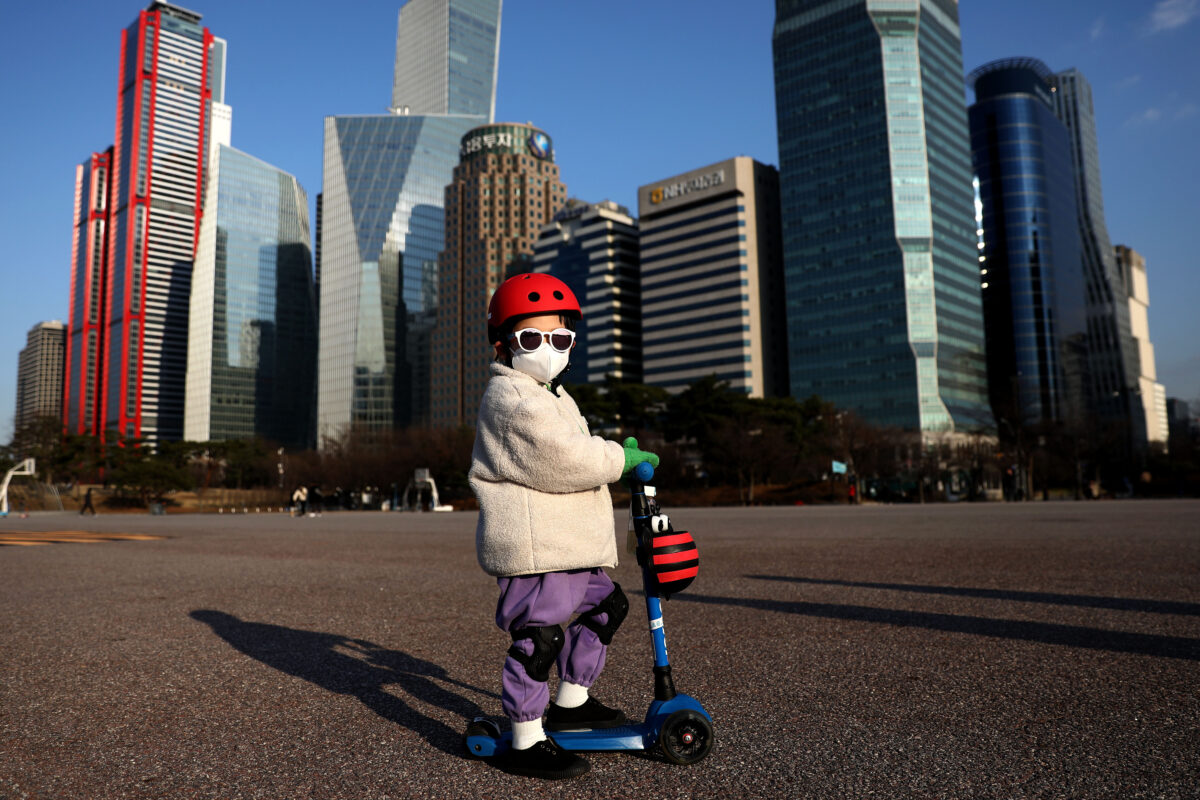South Korea Approves Pfizer’s Vaccine for Children Aged 5 to 11 Amid Increase in COVID-19 Cases
South Korea has approved the use of Pfizer’s coronavirus vaccine for children aged 5 to 11, the Food and Drug Safety Ministry announced on Wednesday, following an increase in the country’s COVID-19 infections. The ministry stated that children with underlying health problems would be given priority to receive the Pfizer vaccine, with a vaccine rollout plan to be announced in March, local outlet Yonhap News Agency reported. Health authorities evaluated the safety of Pfizer’s vaccine in 3,109 children aged 5 to 11, and found that side effects occurred more commonly after the first dose. They noted that the side effects were mild and would typically subside within three days. The vaccine was 90.7 percent effective at preventing children from contracting the virus, with no severe side effects reported so far, the ministry stated. Children aged 5 to 11 will receive one-third of the amount a 12-year-old would get, with two jabs given three weeks apart, while those with significantly declined immunity can get a booster four weeks later. The move comes as the number of COVID-19 cases among younger children has increased significantly in recent weeks, as schools prepare for new semesters beginning in March. South Korea reported 171,452 new cases on Tuesday, a sharp increase from 99,573 a day before. But Prime Minister Kim Boo-kyum urged citizens not to panic, saying that hospitalizations and deaths were still at manageable levels. Kim said that social distancing rules will be relaxed after the current wave peaks, which some experts estimate may come in mid-March. “Omicron’s spread is still racing to its peak, but once it is assured that severe cases and deaths can be stably managed, we will reform the broad framework of our anti-virus quarantine policy, including social distancing,” he told reporters. More than 86 percent of South Korea’s 52 million residents have been vaccinated, with nearly 60 percent having completed their booster shots. Meanwhile, Japan has also recently approved Pfizer’s vaccine for children in this age group, with the vaccine distribution to municipalities and medical facilities expected to begin this week. The Food and Drug Administration of the United States had previously planned to make a decision on Pfizer’s vaccine for children under the age of 5, but the meeting was postponed due to the need for additional data. “We believe additional information regarding the ongoing evaluation of a third dose should be considered as part of our decision-making for potential authorization,” the agency stated. Reuters contributed to this report.

South Korea has approved the use of Pfizer’s coronavirus vaccine for children aged 5 to 11, the Food and Drug Safety Ministry announced on Wednesday, following an increase in the country’s COVID-19 infections.
The ministry stated that children with underlying health problems would be given priority to receive the Pfizer vaccine, with a vaccine rollout plan to be announced in March, local outlet Yonhap News Agency reported.
Health authorities evaluated the safety of Pfizer’s vaccine in 3,109 children aged 5 to 11, and found that side effects occurred more commonly after the first dose. They noted that the side effects were mild and would typically subside within three days.
The vaccine was 90.7 percent effective at preventing children from contracting the virus, with no severe side effects reported so far, the ministry stated.
Children aged 5 to 11 will receive one-third of the amount a 12-year-old would get, with two jabs given three weeks apart, while those with significantly declined immunity can get a booster four weeks later.
The move comes as the number of COVID-19 cases among younger children has increased significantly in recent weeks, as schools prepare for new semesters beginning in March.
South Korea reported 171,452 new cases on Tuesday, a sharp increase from 99,573 a day before. But Prime Minister Kim Boo-kyum urged citizens not to panic, saying that hospitalizations and deaths were still at manageable levels.
Kim said that social distancing rules will be relaxed after the current wave peaks, which some experts estimate may come in mid-March.
“Omicron’s spread is still racing to its peak, but once it is assured that severe cases and deaths can be stably managed, we will reform the broad framework of our anti-virus quarantine policy, including social distancing,” he told reporters.
More than 86 percent of South Korea’s 52 million residents have been vaccinated, with nearly 60 percent having completed their booster shots.
Meanwhile, Japan has also recently approved Pfizer’s vaccine for children in this age group, with the vaccine distribution to municipalities and medical facilities expected to begin this week.
The Food and Drug Administration of the United States had previously planned to make a decision on Pfizer’s vaccine for children under the age of 5, but the meeting was postponed due to the need for additional data.
“We believe additional information regarding the ongoing evaluation of a third dose should be considered as part of our decision-making for potential authorization,” the agency stated.
Reuters contributed to this report.












